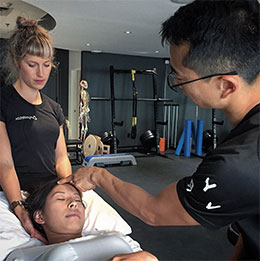
Paying it forward to the future generations. Gilbert Park and Jessie Wong sharing some clinical gems with new graduate Nadine Stunzi
After completing my last practical placement, the process of finding a physiotherapy job was the first step towards taking my student cap off and adopting a therapist mindset. I had a strong draw towards private practice and the thought of finally getting to use what I learned in the real world with very real consequences had me both excited and nervous.
In school we absorbed so much information as facts and then grouped these facts to store them as knowledge. These facts gave us certainties about the world and knowledge gave us the confidence to navigate the process of treating a patient. I knew that for a certain injury, I could apply a certain treatment, over a certain time frame and achieve a certain outcome. So as a fresh therapist I went out to heal the world and apply all the knowledge I had to positively impact patients. A patient would walk in with an injury I had seen in a book and I would apply the knowledge and techniques at my disposal and hope for a desired outcome. Sometimes it would work and sometimes it would fail miserably. This rattled me and drove me to question the validity of what I knew. I was missing something. How could I have been so unprepared for this?
The reality was that I was as prepared as I could be for this. It is impossible to be taught and experience enough in school to become a great therapist. At best, you come out as a competent and safe therapist. How could I change this?
The lightbulb moment for me came while shadowing some very experienced therapists. They had similar knowledge but they had a vastly different way of applying it and applying it differently to each patient. I desired to learn this elusive method. What I quickly learned was that patients are very unique in their individuality and the same approach did not always yield the same result. That is when it became evident that working with humans is an art. It is through experience we gain the wisdom to artfully apply the knowledge we have to impact patients. Wisdom can be acquired with time, mentoring or taking courses. The latter two options are the routes I took to boost my experience as I felt I could achieve this goal within a fraction of the time it would take with direct patient interactions alone. I spent countless hours and thousands of dollars on courses in pursuit of wisdom beyond my years.
Fast forward to the present and now it has been a few years since I was a student. Through reflection I can easily identify the things I wish I knew as a new graduate. Wishing I had these pearls of wisdom from the start is what draws me to mentoring students. My experience as a new graduate, growing therapist, preceptor and now as a clinic director I can see a need for clinics to provide an environment that nurtures students to bridge the gap between “student therapist” to “therapist”. Too often new graduates are thrown into a work environment with the notion of “You’ll get by with what you have” and “You’ll learn as you go”. This seems terribly inefficient and as an experienced therapist I feel inclined to ensure that new graduates entering into our clinics are well equipped with the essential tools and frameworks to hit the ground running.
When hiring a new graduate, it is based mainly on personality. Skills can be taught, but not personality. New graduates and students entering a busy private practice setting can often feel intimidated and get overwhelmed. Senior therapists are in a position to share tools that we take for granted but can greatly change the therapy game for student or new graduates.
New therapists are integral to the health of our industry and helping future generations be the best version of themselves brightens the future of our profession. So if you ever had someone help you to elevate your game, let’s pay it forward.